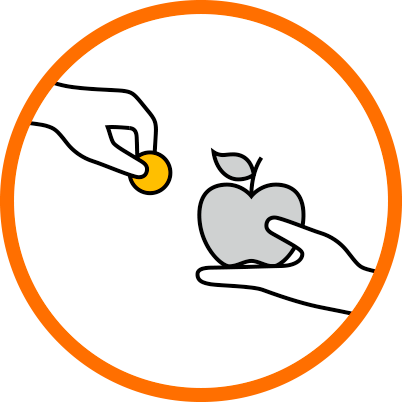What exactly are you buying? Crypto-assets are also called coins or tokens, and may furnish you with a right or a claim.

The purpose of payment tokens lies in their payment function. If your contractual party accepts them as payment instruments, then you are able to purchase goods or services using them. Bitcoin is the best-known example of this kind of crypto-asset.

Security tokens imitate “classical securities” and may be designed in a way that they are similar to bonds or shares. You therefore acquire a claim to recurring payments or may assert voting rights.

Utility tokens primarily serve to provide the holder with a benefit in relation to a specific product or a service. The easiest thing to compare them with is a key that grants access.
Ask yourself the following questions to assess what the respective crypto-asset offers:
- Is it possible to pay for specific products or services with it? Which providers allow you to pay with it? What products or services do you receive in return?
- Are you able to cash out earnings from a crypto-asset? When do you receive such pay-outs? Upon which conditions do such pay-outs depend?
- Do the crypto-assets entitle you to some kind of co-determination or do they provide you with some other kinds of benefits, such as discounts? Are you able to transfer the crypto-assets at will?
- Where can you trade them – are they listed on a platform (a “crypto-exchange”)?
- Is it realistic that someone will buy the crypto-assets off you for a larger amount than you paid for them?
Please note that merely having the characteristic as a token or coin on a blockchain does not translate into value. Whether and what value a crypto-asset actually has depends on the rights and claims you receive by purchasing the crypto-asset or on whether the crypto-asset is also actually listed on a trading platform.
How can I purchase crypto-assets?
You can purchase tokens/coins through crypto-exchanges, on market places, directly from issuers or from third-party providers like Bitcoin vending machines.
What is an Initial Coin Offering (ICO)?
Crypto-assets are often initially issued by means of an ICO. As a rule, it is a form of corporate or project financing. Undertakings collect capital for a project and issue crypto-assets in return that are associated with the respective undertaking or project.
Why are ICOs so risky?
There are currently no legal rules in the form of information and transparency obligations for undertakings for ICOs. Exception for security tokens:
An obligation may exist for the issuer to produce a prospectus. ICOs are frequently conducted at a very early stage, at a time were the underlying business model is not yet mature. At the point of time of the issuance, only a promise of a future benefit and the associated increase in value exists. There is no certainty that such a promise may actually be met in the future!
Caution:
Fraud has becoming increasingly commonplace in conjunction with ICOs. Studies have shown that over 80 percent of the ICOs observed qualified as fraudulent.
Crypto-exchange:
A platform on which tokens are traded (also known as a cryptocurrency exchange)
Marketplace:
Direct trading between the buyer and seller
Issuer:
Issuer of the tokens with the objective to raise capital
Further information:
A to Z of Finance
- You can find important basic information on our website: A to Z of Finance – Investments